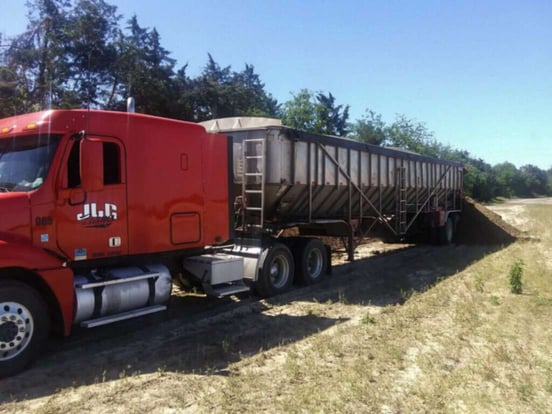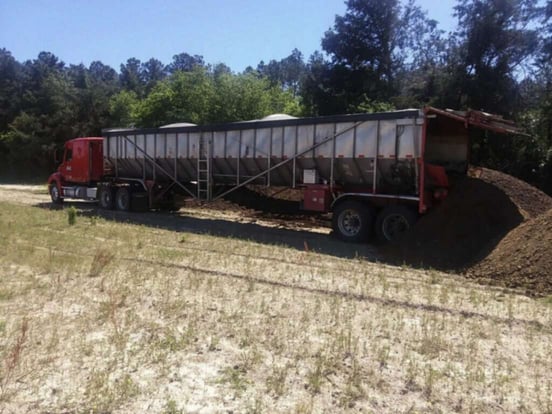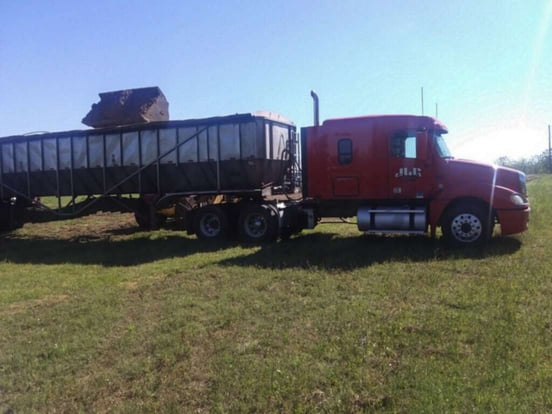JLC FARMS, INC
A Customer Success Story
The Toughest Hauls Require the Toughest Trailers
Jeff Collins and his crew at Georgia-based JLC Farms haul almost anything — even chicken litter. They were looking for workhorse trailers that could haul anything they threw at them —feed, rocks, fertilizer, and more. Good thing they found Trinity.
THE PROBLEM
In the forests and fields of rural Georgia, chicken farming is a major industry. Broilers and eggs make up nearly 40 percent of the state’s production value, bringing in more than $18.4 billion to the state’s economy every year.
But all those chicken farms also bring something else to Georgia — chicken litter. A lot of it.
To protect the chicken’s feet, farmers spread peanut hulls and wood shavings all along the floor. This mixture gets filled with feathers, manure and spilled feed as the chickens go throughout their day, a mixture referred to as chicken litter. A chicken house with 20,000 broilers can produce over 150 million tons of litter per year.
This leaves chicken farmers with a big problem. They’ve got literally tons of highly acidic waste and nowhere for it to go.
That’s where local businessmen like Jeff Collins can step in.

It all comes down to the durability
— Jeff Collins, Owner, JLC Farms, Inc.
and reliability of the trailers.
Time is money.”
A TOUGH JOB MADE EASIER
Initially, Jeff started hauling chicken litter with aluminum dump trailers he already owned. While driving over the bumpy, uneven surfaces of the fields, some of these top-heavy rigs tipped over while fully loaded. These accidents created a risk for his drivers, not to mention the time and money it took to clean up the mess.
Hearing about his problem, a friend sold Jeff a used Trinity belt trailer. Impressed with the improved safety, durability, and flexibility of the trailer, Jeff bought a second used Trinity from someone else.
Today, Jeff is a big advocate for the tough and rugged Trinitys. He now has 14 trailers in his fleet, each one able to carry four loads of chicken litter a day.
Unlike the rigid aluminum dump trucks he used before, Jeff’s fleet of Trinity trailers can withstand the grueling demands of the job. His trailers can flex up to 36 degrees while driving across the fields, and the stainless steel construction can withstand the corrosive acidity of chicken litter.
“We’re in and out of the fields all the time,” Jeff says. “We need trailers that won’t crack or bust. We’ve gotten a lot of good use out of our Trinitys.”
According to Jeff, Trinity’s 48” wide belt trailer is ideal for loading, hauling and unloading chicken litter. The trailer’s steeper slopes allow for the wet chicken litter to slide more easily onto the belt, leaving less residue behind and unloading faster.
Four minutes is all it takes to completely unload one of his trailers. Once the trailer is empty, Jeff can spray it down and get back on the road to haul more chicken litter, rocks or whatever else his Georgia customers need.
“Time is money,” Jeff says. “The less time you can spend in the back cleaning out the trailer, the more time you can spend on the road.”
Jeff also says the liners on his Trinity trailers are another way the brand stands apart from the rest of the industry. Unlike other trailers that just stop their liners at the slope, Trinity offers the option to extend its liners all across the interior of the trailer.
After working with Trinity for the past few years, Jeff says he won’t buy any other trailer.
“It all comes down to the durability and reliability of the trailers,” Jeff says. “I haven’t had a whole lot of trouble, and I’ve met a lot of good people along the way.”
HIGHLIGHTS
THE SOLUTION
In addition to managing his crops at JLC Farms, Jeff runs his own chicken litter distribution business. His crew of drivers regularly work with 650 local chicken farms to haul away their chicken litter and distribute it to nearby crops and fields.
After the chicken farmers clean out the houses, they store the litter in stack houses where it is cured, composted and prepared to load into one of JLC Farms’ Trinity EAGLE BRIDGE® trailers. Jeff and his crew pull the trailers along the rough rural back roads to load up with the litter. They then haul the fertilizer to a nearby farm and spread it on local fields and crops.
For the farmers Jeff works with, chicken litter is the ultimate organic fertilizer. It’s filled with phosphorus, potassium, zinc and other essential nutrients that help plants thrive. Local crops fertilized with chicken litter produce higher yields with less environmental impact than traditional fertilizers. It’s a renewable resource that won’t run out anytime soon — especially in Georgia.
Jeff knows just how profitable chicken litter can be. A few years ago, Jeff started using chicken litter on his own crops. The results were so noticeable that his neighbors and other nearby farmers started asking questions.
Immediately, Jeff recognized the opportunity — but the job wasn’t always so easy.




